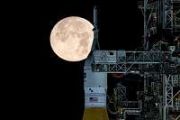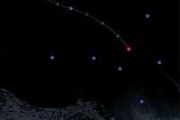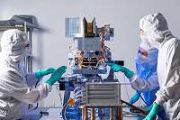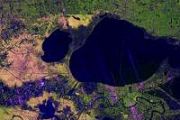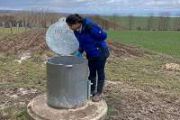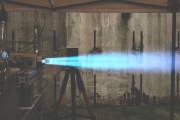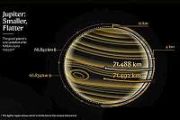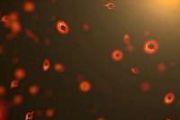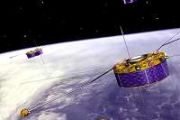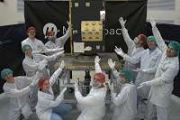
Copernical Team
Earth from Space: Namibian landforms
 Image:
This image may resemble the surface of Mars, but it was actually captured by the Copernicus Sentinel-2 mission, revealing the stunning terrain of northwest Namibia.
Image:
This image may resemble the surface of Mars, but it was actually captured by the Copernicus Sentinel-2 mission, revealing the stunning terrain of northwest Namibia. Week in images: 29 April - 03 May 2024

Week in images: 29 April - 03 May 2024
Discover our week through the lens
China is sending a probe to get samples from the less-explored far side of the moon
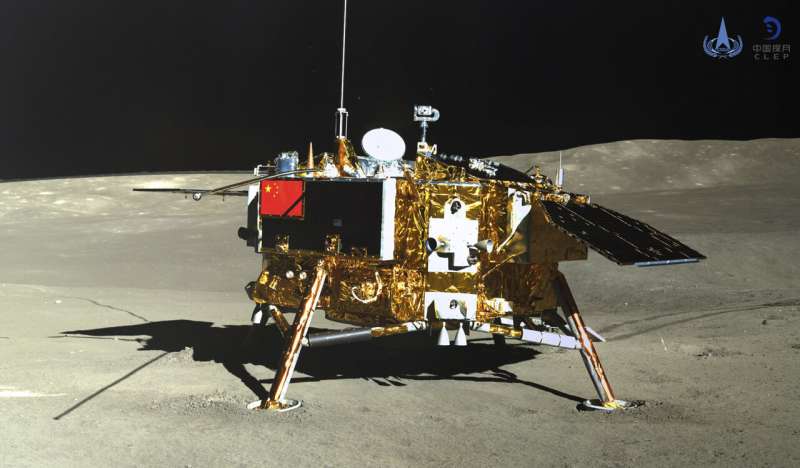
UTA scientists explore quantum aspects of gravity using neutrinos
 Einstein's theory of general relativity describes gravity as a result of space and time curving. This theory accounts for the Earth's gravity, which anchors us and causes objects to fall.
In contrast, high-energy physics investigates subatomic particles that follow the principles of quantum mechanics, notable for their random fluctuations and the inherent uncertainty in particle positions
Einstein's theory of general relativity describes gravity as a result of space and time curving. This theory accounts for the Earth's gravity, which anchors us and causes objects to fall.
In contrast, high-energy physics investigates subatomic particles that follow the principles of quantum mechanics, notable for their random fluctuations and the inherent uncertainty in particle positions Microsoft announces $2.2 bn AI, cloud investment in Malaysia
 Microsoft pledged a $2.2 billion investment in artificial intelligence and cloud computing in Malaysia on Thursday to help develop the country's AI infrastructure.
The tech giant's chief executive Satya Nadella is on a three-nation tour of Southeast Asia - Indonesia, Thailand and Malaysia - to announce a range of investments in data centres, AI and cloud services.
"Today, Microsoft ann
Microsoft pledged a $2.2 billion investment in artificial intelligence and cloud computing in Malaysia on Thursday to help develop the country's AI infrastructure.
The tech giant's chief executive Satya Nadella is on a three-nation tour of Southeast Asia - Indonesia, Thailand and Malaysia - to announce a range of investments in data centres, AI and cloud services.
"Today, Microsoft ann X-ray satellite XMM-newton sees 'space clover' in a new light
 Astronomers have discovered enormous circular radio features of unknown origin around some galaxies. Now, new observations of one dubbed the Cloverleaf suggest it was created by clashing groups of galaxies.
Studying these structures, collectively called ORCs (odd radio circles), in a different kind of light offered scientists a chance to probe everything from supersonic shock waves to blac
Astronomers have discovered enormous circular radio features of unknown origin around some galaxies. Now, new observations of one dubbed the Cloverleaf suggest it was created by clashing groups of galaxies.
Studying these structures, collectively called ORCs (odd radio circles), in a different kind of light offered scientists a chance to probe everything from supersonic shock waves to blac Hi-C Rocket Experiment Achieves Never-Before-Seen Look at Solar Flares
 After months of preparation and years since its last flight, the upgraded High Resolution Coronal Imager Flare mission - Hi-C Flare, for short - took to the skies for a never-before-seen view of a solar flare.
The low-noise cameras - built at NASA's Marshall Space Flight Center in Huntsville, Alabama - are part of a suite of state-of-the-art instruments on board the Black Brant IX sounding
After months of preparation and years since its last flight, the upgraded High Resolution Coronal Imager Flare mission - Hi-C Flare, for short - took to the skies for a never-before-seen view of a solar flare.
The low-noise cameras - built at NASA's Marshall Space Flight Center in Huntsville, Alabama - are part of a suite of state-of-the-art instruments on board the Black Brant IX sounding Twisting and binding matter waves with photons in a cavity
 Precisely measuring the energy states of individual atoms has been a historical challenge for physicists due to atomic recoil. When an atom interacts with a photon, the atom "recoils" in the opposite direction, making it difficult to measure the position and momentum of the atom precisely. This recoil can have big implications for quantum sensing, which detects minute changes in parameters, for
Precisely measuring the energy states of individual atoms has been a historical challenge for physicists due to atomic recoil. When an atom interacts with a photon, the atom "recoils" in the opposite direction, making it difficult to measure the position and momentum of the atom precisely. This recoil can have big implications for quantum sensing, which detects minute changes in parameters, for Physicists arrange atoms in extremely close proximity
 Proximity is key for many quantum phenomena, as interactions between atoms are stronger when the particles are close. In many quantum simulators, scientists arrange atoms as close together as possible to explore exotic states of matter and build new quantum materials.
They typically do this by cooling the atoms to a stand-still, then using laser light to position the particles as close as
Proximity is key for many quantum phenomena, as interactions between atoms are stronger when the particles are close. In many quantum simulators, scientists arrange atoms as close together as possible to explore exotic states of matter and build new quantum materials.
They typically do this by cooling the atoms to a stand-still, then using laser light to position the particles as close as Noise can enhance quantum teleportation quality
 Quantum teleportation, the process where the state of a quantum particle, or qubit, is transferred from one place to another without moving the particle itself, typically relies on entanglement between an additional pair of qubits. Ideally, this transfer should occur flawlessly, but real-world conditions introduce noise that can degrade teleportation quality.
Researchers at the University
Quantum teleportation, the process where the state of a quantum particle, or qubit, is transferred from one place to another without moving the particle itself, typically relies on entanglement between an additional pair of qubits. Ideally, this transfer should occur flawlessly, but real-world conditions introduce noise that can degrade teleportation quality.
Researchers at the University 



